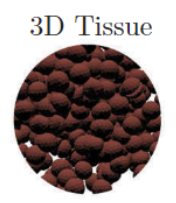Computational modeling cancer growth and radiation therapy
Supervisor: Dr. Mikko Karttunen
Can extend to MSc?: Yes
Project Description (Abstract):
Radiation therapy (RT) is one of the most common cancer treatments - about 70% of cancer patients receive RT either as the main treatment or in combination with others. RT can be delivered, for example, as x-rays, protons or electrons. The main problem is that radiation is not selective: It damages both cancerous as well as healthy cells and thus dose optimization and targeting of radiation are crucial since both cancerous and healthy cells are affected. RT damages and kills cancer cells by using ionizing radiation. From the physical point of view, RT causes molecular level damage which is then manifested in the mechanobiological properties of (cancer) cells. In this project, the student will use our in-developed CellSim3D simulation code to study mechanical properties of cells before and after exposure to radiation. The aim is to understand mechanobiology and its relation to cancer growth and metastasis using quantitative and predictive computational modeling. The main target is to map the local mechanical stress landscape in tissues [1] – it has been show that the stress landscape couples to cell motility (metastasis), and thus targeting mechanical properties may even provide a new pathway to cancer treatment.
The student(s) need(s) a strong mathematical skills and background in computer simulations or/and programming as the nature of the work is theoretical and computational. The simulations will be done using our in-house developed software called CellSim3D [2].
This project will not be influenced by possible further closures should the pandemic continue.

Figure: Example of a cell aggregate from a simulation using CellSim3D.
References:
[1] Jamming and force distribution in growing epithelial tissue, Pranav Madhikar, Jan Åström, Björn Baumeier, Mikko Karttunen, Phys. Rev. Res. 3, 023129 (2021).
[2] CellSim3D: GPU Accelerated Software for Simulations of Cellular Growth and Division in Three Dimensions, Pranav Madhikar, Jan Åström, Jan Westerholm, Mikko Karttunen, Computer Physics Communications 232, 206-213 (2018).

